| Listing 1 - 8 of 8 |
Sort by
|
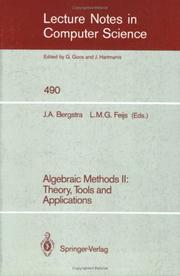
ISBN: 3540539123 3540463518 Year: 1991 Volume: vol 490 Publisher: Berlin ; New York, NY : Springer-Verlag,
Abstract | Keywords | Export | Availability | Bookmark
 Loading...
Loading...Choose an application
- Reference Manager
- EndNote
- RefWorks (Direct export to RefWorks)
The proper treatment and choice of the basic data structures is an important and complex part in the process of program construction. Algebraic methods provide techniques for data abstraction and the structured specification, validation and analysis of data structures. This volume originates from a workshop organized within ESPRIT Project 432 METEOR, An Integrated Formal Approach to Industrial Software Development, held in Mierlo, The Netherlands, September 1989. The volume includes five invited contributions based on workshop talks given by A. Finkelstein, P. Klint, C.A. Middelburg, E.-R. Olderog, and H.A. Partsch. Ten further papers by members of the METEOR team are based on talks given at the workshop. The workshop was a successor to an earlier one held in Passau, Germany, June 1987, the proceedings of which were published as Lecture Notes in Computer Science, Vol. 394.
Algebra --- -Computer software --- -681.3 *C2 --- 681.3*D1 --- 681.3*D2 --- 681.3*D3 --- 681.3*F3 --- Software, Computer --- Computer systems --- Mathematics --- Mathematical analysis --- Congresses --- Development --- -Congresses --- Computer communication networks: data communications; OSI; security and protection --- Programming techniques--See also {681.3*E} --- Software engineering: protection mechanisms; standards--See also {681.3*K63}; {681.3*K51} --- Programming languages --- Logics and meanings of programs (Theory of computation) --- Computer software --- Congresses. --- 681.3*F3 Logics and meanings of programs (Theory of computation) --- 681.3*D3 Programming languages --- 681.3*D2 Software engineering: protection mechanisms; standards--See also {681.3*K63}; {681.3*K51} --- 681.3*D1 Programming techniques--See also {681.3*E} --- 681.3 *C2 Computer communication networks: data communications; OSI; security and protection --- 681.3 *C2 --- Development&delete& --- Algebra. --- Mathematics. --- Data structures (Computer scienc. --- Software engineering. --- Computer science. --- Applications of Mathematics. --- Data Structures and Information Theory. --- Software Engineering. --- Programming Techniques. --- Programming Languages, Compilers, Interpreters. --- Informatics --- Science --- Computer software engineering --- Engineering --- Math
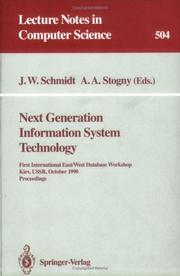
ISBN: 3540541411 0387541411 3540474447 9783540541417 9780387541419 Year: 1991 Volume: 504 Publisher: Berlin ; New York, NY : Springer-Verlag,
Abstract | Keywords | Export | Availability | Bookmark
 Loading...
Loading...Choose an application
- Reference Manager
- EndNote
- RefWorks (Direct export to RefWorks)
Currently, the field of information systems technology is rapidly extending into several dimensions. There is the semantic dimension (including object orientation, data deduction and extended knowledge representation schemes), there is improved systems integration, and there are new tools. All these extensions aim to provide semantically richer and better engineered information systems that allow for more adequate and complete representations and thus extend the effective use of database technology to a wider class of applications. Database researchers and developers, whether they are committed to application or to system construction, are convinced that next-generation information system technology will be heavily determined by a handful of new concepts that they have to understand and work out in detail now. This volume concentrates on the following topics: - Extended data types and data models, database programming languages; - Rule-based data deduction, expert systems, knowledge bases; - Object orientation and semantic data modelling; - DB application development, methodologies and tools; - Interface technology, parallelism, interoperability, ...; - New database applications.
Database management --- 681.3*D3 --- 681.3*F4 --- 681.3*H0 --- Congresses. --- Programming languages --- Mathematical logic and formal languages (Theory of computation) --- Computerwetenschap--?*H0 --- 681.3*F4 Mathematical logic and formal languages (Theory of computation) --- 681.3*D3 Programming languages --- Congresses --- Information storage and retrieval systems --- Technology --- Data structures (Computer scienc. --- Computer science. --- Database management. --- Information technology. --- Data Structures and Information Theory. --- Programming Techniques. --- Database Management. --- Programming Languages, Compilers, Interpreters. --- Mathematical Logic and Formal Languages. --- IT in Business. --- Data base management --- Data services (Database management) --- Database management services --- DBMS (Computer science) --- Generalized data management systems --- Services, Database management --- Systems, Database management --- Systems, Generalized database management --- Electronic data processing --- Informatics --- Science --- IT (Information technology) --- Telematics --- Information superhighway --- Knowledge management --- Database management - Congresses
Book
ISBN: 3540544143 3540476156 Year: 1991 Volume: vol 525 Publisher: Berlin Heidelberg Budapest Springer Verlag
Abstract | Keywords | Export | Availability | Bookmark
 Loading...
Loading...Choose an application
- Reference Manager
- EndNote
- RefWorks (Direct export to RefWorks)
Spatial database management has become an important subarea of current database research. Research in this area is often characterized by interdisciplinary cooperation: computer scientists work with geographers andenvironmental scientists to provide better access to spatial databases of steadily increasing size. After the First Symposium on Large Spatial Databases (SSD '89) was held in Santa Barbara, California, in 1989 (and its proceedings published as Volume 409 of this series), a second symposium (SSD'91) was held in Zurich, Switzerland. This proceedings volume contains the papers presented at SSD '91. Topics include spatial data models and access methods, performance studies, geometric algorithms, spatial query languages and user interfaces, geographic information systems, and object-oriented techniques.
681.3*H28 --- 681.3*A0 --- 681.3*I35 --- Database applications --- General --- Computational geometry and object modeling (Computer graphics) --- 681.3*I35 Computational geometry and object modeling (Computer graphics) --- 681.3*A0 General --- 681.3*H28 Database applications --- Geographic information systems --- Congresses --- Database management --- Data structures (Computer scienc. --- Geographical information systems. --- Computer science. --- Database management. --- Artificial intelligence. --- Data Structures and Information Theory. --- Geographical Information Systems/Cartography. --- Programming Techniques. --- Database Management. --- Data Storage Representation. --- Artificial Intelligence. --- AI (Artificial intelligence) --- Artificial thinking --- Electronic brains --- Intellectronics --- Intelligence, Artificial --- Intelligent machines --- Machine intelligence --- Thinking, Artificial --- Bionics --- Cognitive science --- Digital computer simulation --- Electronic data processing --- Logic machines --- Machine theory --- Self-organizing systems --- Simulation methods --- Fifth generation computers --- Neural computers --- Data base management --- Data services (Database management) --- Database management services --- DBMS (Computer science) --- Generalized data management systems --- Services, Database management --- Systems, Database management --- Systems, Generalized database management --- Informatics --- Science --- Geographical information systems --- GIS (Information systems) --- Information storage and retrieval systems --- Geography

ISBN: 3540540091 3540473483 Year: 1991 Publisher: Berlin Springer
Abstract | Keywords | Export | Availability | Bookmark
 Loading...
Loading...Choose an application
- Reference Manager
- EndNote
- RefWorks (Direct export to RefWorks)
This volume presents the proceedings of the 1991 Symposium on Mathematical Fundamentals of Database and Knowledge Base Systems, held in Rostock, FRG, May 6-9, 1991. This is the third in a series of biannual MFDBS conferences, which in future will be held together with ICDT, the International Conference on Database Theory. MFDBS 91 covers new developments in theoretical aspects of database and knowledge base systems and the design of databases and knowledge bases. Topics of the conference are: database and knowledge base models; deductive database and knowledge base systems; logical, algebraic and combinatorial fundamentals of database theory and design of databases; object-oriented databases and object-oriented modeling; fundamentals of query languages, transaction processing, distributed databases, concurrency control, access strategies, recovery, security, privacy, safety; fundamentals for integrity constraints and consistency in databases; models for database machines; models for user interfaces; design and implementation of non-standard databases.
681.3*H2 --- Database management: security; integrity; protection--See also {?681.5*E5} --- 681.3*H2 Database management: security; integrity; protection--See also {?681.5*E5} --- Data structures (Computer scienc. --- Artificial intelligence. --- Computer science. --- Database management. --- Combinatorics. --- Data Structures and Information Theory. --- Artificial Intelligence. --- Programming Techniques. --- Models and Principles. --- Database Management. --- Data base management --- Data services (Database management) --- Database management services --- DBMS (Computer science) --- Generalized data management systems --- Services, Database management --- Systems, Database management --- Systems, Generalized database management --- Electronic data processing --- Combinatorics --- Algebra --- Mathematical analysis --- Informatics --- Science --- AI (Artificial intelligence) --- Artificial thinking --- Electronic brains --- Intellectronics --- Intelligence, Artificial --- Intelligent machines --- Machine intelligence --- Thinking, Artificial --- Bionics --- Cognitive science --- Digital computer simulation --- Logic machines --- Machine theory --- Self-organizing systems --- Simulation methods --- Fifth generation computers --- Neural computers
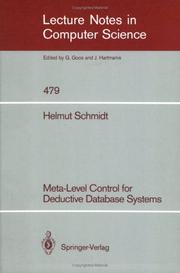
ISBN: 3540537546 3540470824 Year: 1991 Volume: 479 *25 Publisher: Berlin Heidelberg London Springer-Verlag
Abstract | Keywords | Export | Availability | Bookmark
 Loading...
Loading...Choose an application
- Reference Manager
- EndNote
- RefWorks (Direct export to RefWorks)
The development of database technology has currently reached the stage of deductive database systems which use Horn clauses for defining relations. An important characteristic of these systems is the clear separation of logic and control. However, the programmer cannot affect the control part of a deductive database system. To eliminate this deficiency, this monograph presents a so-called expert deductive database system that allows explicit control of the deduction process. The system consists of an object-level describing the logical aspects of a problem and of a meta-level that contains application-specific control information affecting the object-level deduction process. For example, object-level rules can be disregarded, and some tuples deduced at the object-level can be preferred to others. Besides the architecture of this system, the book also identifies some important possibilities of deduction control which are explained by characteristic examples.
Banques de données--Gestion --- Bases de données déductives --- Data base management --- Database management --- Databasebeheer --- Databases--Beheer --- Deductieve data bases --- Deductive data bases --- Deductive databases --- Gegevensbanken--Beheer --- Gegevensbestanden--Beheer --- Generalized data management systems --- Systems [Data base management ] --- Systems [Generalized data base management ] --- 681.3*H28 --- 681.3*H23 --- 681.3*H24 --- Database applications --- Languages: data description languages; DDL; data manupulation languages; DML;query languages; report writers (Database management) --- Systems: concurrency; distributed systems; query processing; transaction processing (Database management) --- Database management. --- Deductive databases. --- 681.3*H24 Systems: concurrency; distributed systems; query processing; transaction processing (Database management) --- 681.3*H23 Languages: data description languages; DDL; data manupulation languages; DML;query languages; report writers (Database management) --- 681.3*H28 Database applications --- Databases --- Data services (Database management) --- Database management services --- DBMS (Computer science) --- Services, Database management --- Systems, Database management --- Systems, Generalized database management --- Electronic data processing --- Data structures (Computer scienc. --- Artificial intelligence. --- Data Structures and Information Theory. --- Database Management. --- Artificial Intelligence. --- AI (Artificial intelligence) --- Artificial thinking --- Electronic brains --- Intellectronics --- Intelligence, Artificial --- Intelligent machines --- Machine intelligence --- Thinking, Artificial --- Bionics --- Cognitive science --- Digital computer simulation --- Logic machines --- Machine theory --- Self-organizing systems --- Simulation methods --- Fifth generation computers --- Neural computers
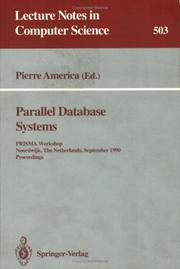
ISBN: 3540541322 3540474323 Year: 1991 Volume: vol 503 Publisher: Berlin London Paris Springer
Abstract | Keywords | Export | Availability | Bookmark
 Loading...
Loading...Choose an application
- Reference Manager
- EndNote
- RefWorks (Direct export to RefWorks)
This volume presents the proceedings of a workshop on parallel database systems organized by the PRISMA (Parallel Inference and Storage Machine) project. The invited contributions by internationally recognized experts give a thorough survey of several aspects of parallel database systems. The second part of the volume gives an in-depth overview of the PRISMA system. This system is based on a parallel machine, where the individual processors each have their own local memory and communicate with each other over a packet-switched network. On this machine a parallel object-oriented programming language, POOL-X, has been implemented, which provides dedicated support for database systems as well as general facilities for parallel programming. The POOL-X system then serves as a platform for a complete relational main-memory database management system, which uses the parallelism of the machine to speed up significantly the execution of database queries. The presentation of the PRISMA system, together with the invited papers, gives a broad overview of the state of the art in parallel database systems.
Banques de données--Gestion --- Computer architecture --- Computerarchitectuur --- Data base management --- Database management --- Databasebeheer --- Databases--Beheer --- Gegevensbanken--Beheer --- Gegevensbestanden--Beheer --- Generalized data management systems --- Ordinateurs--Architecture --- Parallel processing (Electronic computers) --- Parallelle verwerking (Computers) --- Systems [Data base management ] --- Systems [Generalized data base management ] --- Traitement parallèle (Ordinateurs) --- 681.3*C12 --- 681.3*D13 --- 681.3*H24 --- Multiple data stream architectures (multiprocessors): MIMD; SIMD; pipeline and parallel processors; array-, vector-, associative processors; interconnection architectures: common bus, multiport memory, crossbar switch --- Concurrent programming --- Systems: concurrency; distributed systems; query processing; transaction processing (Database management) --- 681.3*H24 Systems: concurrency; distributed systems; query processing; transaction processing (Database management) --- 681.3*D13 Concurrent programming --- 681.3*C12 Multiple data stream architectures (multiprocessors): MIMD; SIMD; pipeline and parallel processors; array-, vector-, associative processors; interconnection architectures: common bus, multiport memory, crossbar switch --- Computer network architectures. --- Data structures (Computer scienc. --- Database management. --- Computer science. --- Computer System Implementation. --- Data Structures and Information Theory. --- Database Management. --- Programming Techniques. --- Processor Architectures. --- Informatics --- Science --- Architectures, Computer network --- Network architectures, Computer --- Data services (Database management) --- Database management services --- DBMS (Computer science) --- Services, Database management --- Systems, Database management --- Systems, Generalized database management --- Electronic data processing
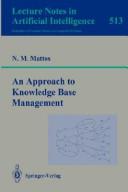
ISBN: 354054268X 038754268X 3540475400 Year: 1991 Volume: 513 *30 Publisher: Berlin ; New York, NY : Springer-Verlag,
Abstract | Keywords | Export | Availability | Bookmark
 Loading...
Loading...Choose an application
- Reference Manager
- EndNote
- RefWorks (Direct export to RefWorks)
This book addresses the development of a new generation of systems, Knowledge Base Management Systems (KBMS), specially constructed for effective and efficient management of knowledge bases, with the aim of filling part of the technological gap between artificial intelligence and databases. The book first investigates in detail the design process, the architecture, and the working methods of knowledge based systems (KS) in order to point out the key characteristics of the field as well as its current limitations, which serve then as basis for an exact formulation of KS requirements. An analysis and evaluation of other approaches (e.g., conventional DBS, non-standard DBS, coupling expert systems and DBS) to knowledge management is given. The book shows that in developing KBMS, the experience obtained by the investigation of each of these approaches is extremely important since they provide the basic concepts for building KBMS. The approaches should not be viewed as complete and final but as part of research work towards KBMS. A novel architecture is described for KBMS which integrates the functionality, flexibility and modeling power of DBS and AI. The main part of the book deals with all important architectural problems of KBMS: methods for knowledge representation with special emphasis on abstraction concepts, language proposals, and concepts for performance improvement. The book is based on practical experience accumulated over five years of successful research in coupling existing expert systems and DBS, extending DBS with deductive capabilities, and above all in the design and implementation of a KBMS prototype. Thus the book's proposals are illustrated with detailed descriptions of their realization in existing systems or prototypes.
681.3*H2 --- Database management. --- Expert systems (Computer science) --- 681.3*I24 --- 681.3*I25 --- Knowledge-based systems (Computer science) --- Systems, Expert (Computer science) --- Artificial intelligence --- Computer systems --- Soft computing --- Data base management --- Data services (Database management) --- Database management services --- DBMS (Computer science) --- Generalized data management systems --- Services, Database management --- Systems, Database management --- Systems, Generalized database management --- Electronic data processing --- Database management: security; integrity; protection--See also {?681.5*E5} --- Knowledge representation formalisms and methods: frames and scripts; predicate logic; relation systems; representation languages; procedural and rule-based representations; semantic networks (Artificial intelligence) --- Programming languages and software: expert system tools and techniques (Artificial intelligence)--See also {681.3*D32} --- Expert systems (Computer science). --- 681.3*I25 Programming languages and software: expert system tools and techniques (Artificial intelligence)--See also {681.3*D32} --- 681.3*I24 Knowledge representation formalisms and methods: frames and scripts; predicate logic; relation systems; representation languages; procedural and rule-based representations; semantic networks (Artificial intelligence) --- 681.3*H2 Database management: security; integrity; protection--See also {?681.5*E5} --- Database management --- Congresses --- Artificial intelligence. --- Data structures (Computer scienc. --- Computer science. --- Information technology. --- Artificial Intelligence. --- Data Structures and Information Theory. --- Database Management. --- Programming Techniques. --- IT in Business. --- IT (Information technology) --- Technology --- Telematics --- Information superhighway --- Knowledge management --- Informatics --- Science --- AI (Artificial intelligence) --- Artificial thinking --- Electronic brains --- Intellectronics --- Intelligence, Artificial --- Intelligent machines --- Machine intelligence --- Thinking, Artificial --- Bionics --- Cognitive science --- Digital computer simulation --- Logic machines --- Machine theory --- Self-organizing systems --- Simulation methods --- Fifth generation computers --- Neural computers
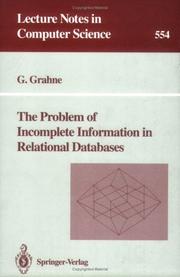
ISBN: 3540549196 3540465073 Year: 1991 Volume: vol 554 Publisher: New York Springer-Verlag
Abstract | Keywords | Export | Availability | Bookmark
 Loading...
Loading...Choose an application
- Reference Manager
- EndNote
- RefWorks (Direct export to RefWorks)
In a relational database the information is recorded as rows in tables. However, in many practical situations the available information is incomplete and the values for some columns are missing. Yet few existing database management systems allow the user to enter null values in the database. This monograph analyses the problems raised by allowing null values in relational databases. The analysis covers semantical, syntactical, and computational aspects. Algorithms for query evaluation, dependency enforcement and updates in the presence of null values are also given. The analysis of the computational complexity of the algorithms suggests that from a practical point of view the database should be stored as Horn tables, which are generalizations of ordinary relations, allowing null values and Horn clause-like restrictions on these null values. Horn tables efficiently support a large class of queries, dependencies and updates.
Bases de données relationnelles --- Relational databases --- Relationele databases --- 681.3*H2 --- 681.3*I2 --- Relational data bases --- Databases --- Database management: security; integrity; protection--See also {?681.5*E5} --- Artificial intelligence. AI --- Relational databases. --- 681.3*I2 Artificial intelligence. AI --- 681.3*H2 Database management: security; integrity; protection--See also {?681.5*E5} --- Relational data bases. --- Data structures (Computer science). --- Database management. --- Algorithms. --- Artificial intelligence. --- Data Structures and Information Theory. --- Database Management. --- Algorithm Analysis and Problem Complexity. --- Artificial Intelligence. --- Data base management --- Data services (Database management) --- Database management services --- DBMS (Computer science) --- Generalized data management systems --- Services, Database management --- Systems, Database management --- Systems, Generalized database management --- Electronic data processing --- Information structures (Computer science) --- Structures, Data (Computer science) --- Structures, Information (Computer science) --- File organization (Computer science) --- Abstract data types (Computer science) --- AI (Artificial intelligence) --- Artificial thinking --- Electronic brains --- Intellectronics --- Intelligence, Artificial --- Intelligent machines --- Machine intelligence --- Thinking, Artificial --- Bionics --- Cognitive science --- Digital computer simulation --- Logic machines --- Machine theory --- Self-organizing systems --- Simulation methods --- Fifth generation computers --- Neural computers --- Algorism --- Algebra --- Arithmetic --- Foundations
| Listing 1 - 8 of 8 |
Sort by
|

 Search
Search Feedback
Feedback About UniCat
About UniCat  Help
Help News
News